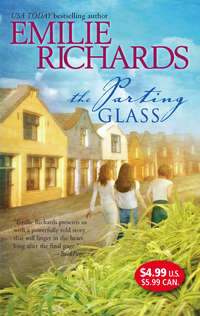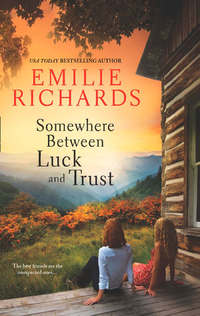
Полная версия
Fox River
They hadn’t attended church together, either. There was a plaque listing generations of Warwicks on the wall at St. Albans, the Episcopal church where the most powerful people in Ridge’s Race convened on Sunday morning. There were Ashbournes on the plaque, as well, and Julia had been christened there, a squalling infant held firmly in the strong arms of the father who had died when she was only four. But for as long as Julia could remember, on the rare occasions when Maisy took her to church, Maisy drove into Leesburg or Fairfax and chose congregations and religions at random.
Even without common churches or schools, Bard had been a presence in Julia’s life. Millcreek Farm was just down the road. As a little girl she had seen him pass by on sleek Thoroughbreds or in one of a series of expensive sports cars. She had seen him in town, discussed weather and local politics while waiting in line at the post office, watched him shop for bourbon and bridles in Middleburg. Until she was twenty he had been a local fixture, like miles of four-rail fencing and Sundowner horse trailers.
Then one day, when her whole world lay in pieces at her feet, she had finally taken a good look at Lombard Warwick, sought-after bachelor, son of Brady Warwick and Grace Lombard, heir to Millcreek Farm, graduate of Yale law school, owner of champion hunters in a region filled with exquisite Thoroughbreds.
She thought now that Bard had been at his peak that year. He’d been thirty-one and appallingly handsome. His dark hair hadn’t yet been touched by gray; his green eyes had been clear and untroubled. He had a long, elegant jaw shadowed by a jet-black beard, and hatchet-sharp cheekbones that defined a face as confident as it was aristocratic. He had a way of looking at a female that had taught more women about their sexuality than Mama’s muddled lectures or high school health class.
She hadn’t fallen in love with him, but she had been drawn to his strength and self-assurance, something nearly as powerful that had, in the end, changed her life.
Today Bard had much of the same physical appeal. He was heavier, following in the footsteps of his father, who had seriously taxed the county’s sturdiest quarter horses. So far the extra pounds merely made Bard more a man to be reckoned with. He was tall and big-boned, and he carried himself with military bearing. He was rarely challenged and even more rarely beaten in any endeavor.
The other changes were subtler. The eyes were still untroubled, but troubling. The silver at his temples was attractive, but misleading. Age hadn’t brought with it serenity. He was intelligent, but not necessarily insightful, able to bide his time but never, never patient.
Now was no exception. “Julia, I’m waiting to hear why Maisy was here. This new push to go home…that wouldn’t happen to have come from her, would it?”
“Is it suddenly necessary to report all conversations with my mother?”
“I don’t want her upsetting you.”
His voice had risen a tone. She could visualize him tugging at an earlobe, the one visible vice he allowed himself when he was angry.
“Bard, you’re upsetting me.”
“Why?”
“Because you’re trying to run my life.”
“Dr. Jeffers thinks she’ll set back your recovery. This is Maisy we’re talking about. I’m surprised she was able to find her way here, that she didn’t end up on some side road sorting autumn leaves by size and color.”
She was torn between outrage and a vision of Maisy doing exactly that. “She loves me. And she’s worried.”
His voice softened. “We’re all worried, sugar. And that’s why I want you well as soon as possible.”
“I don’t want to stay here. I can see a therapist privately. We can hire someone to help me. It would be enormously less expensive than keeping me here.”
“But not as beneficial.”
She knew it was time to remove the kid gloves. She straightened a little, carefully turning her head until she was certain she was looking at him. “You don’t want me at home because you’re embarrassed. You don’t want anyone to know that a wife of yours has gone off the deep end and manufactured her own personal handicap.”
“You’re completely forgetting about Callie. Do you think it’s good for her to see her mother like this? She’s upset enough as it is. She doesn’t need a daily dose of you walking into walls and tripping over doorways.”
Her frustration blazed into full-blown anger. “What’s the sudden concern for Callie, Bard? Most of the time you don’t think twice about her.”
“I’ll assume that’s coming directly from your mother, too.”
“It’s coming directly from me.”
“I don’t fawn over Callie. That certainly doesn’t mean I don’t care about her.”
“I said you don’t think twice about her. Callie is my job. I make the decisions. I give the attention.”
“And because it’s been your job, Callie expects you to be well and able to take care of her.”
“She needs me with her, whether I can see or not. Children imagine the worst if the grown-ups in their lives aren’t honest.”
“I’ve reassured her.”
“Are you spending time with her? Have you taken her out to eat? Taken her to a movie? Helped with her homework?”
“I have a job. I’m doing what I can.”
Bard’s job had never been a source of tension before, because Julia had always been home to fill in the gaps. He was a real estate attorney for Virginia Vistas, one of the area’s largest development firms. When he wasn’t closing and negotiating deals, he worked with the developers both as an attorney and a private investor. He had a gift for knowing when to buy and sell God’s green earth that made the substantial holdings he’d inherited from his wealthy parents a mere line or two in his financial portfolio.
“Are you spending any time with her?” she asked. “She loves to ride with you. Have you taken her riding?”
“The last time she rode with one of her parents wasn’t exactly a roaring success.”
“More reason. She needs to see that my accident was a fluke.”
“I’m doing what I can.”
“She needs more.”
“Then you’ll need to get better quickly, won’t you? Callie’s welfare should be an incentive.”
“You can be a bastard, can’t you?”
He was silent. Without visual cues, she could only imagine the expression on his face. But the possible range wasn’t pretty.
“I’ll take her riding this weekend,” he said at last.
It was a concession, but not much of one, since today was only Monday. “Bard, nothing that’s happened to me is under my conscious control. And it may not go away quickly. If it doesn’t, I have no intention of staying at Gandy Willson just because you want me out of sight.”
“I’d like you to stop saying that. You need to stay here to get well.”
“You can catch Callie before she goes to bed. Please go home and read her a story for me.”
He was silent a moment. “All right. But I’ll let her read to me. She needs practice.”
It was an old argument. Callie had a form of dyslexia that made reading a struggle. Bard believed if the little girl just read out loud enough, her disabilities would disappear. No matter how much she hated it or how much it upset her.
“Will you read to her instead, please?” Julia asked. “She can practice reading when everything else is back to normal.”
“You want me to spend time with her, but you want to tell me exactly how to spend it.”
“If you spent more time with her, I wouldn’t have to tell you.”
When he spoke, he was standing directly in front of her. She hadn’t even heard him move. “If it will make you feel better, I’ll read to her. But will you stop fighting everything and everyone and concentrate on seeing again?”
She didn’t repeat that all the concentration in the world wasn’t going to bring back her eyesight. She recognized a compromise when she heard one. “I’ll do whatever it takes,” she promised.
“That’s my girl.” He bent and kissed her, not on the cheek but full on the lips.
“I’ll see you tomorrow?”
“That would be wonderful.” His voice was husky. “I hope you will see me tomorrow.”
“Me, too.”
“I’m flying down to Richmond early in the morning, and I won’t be by until after dinner. Sleep well.”
That was a promise she couldn’t make. “You, too.”
He closed the door gently enough, but moments later it still resounded. She was left with an assortment of feelings.
She had never dealt well with her own emotions. Only rarely had she understood what fed the creative well inside her or sealed it completely. She had found it best not to tamper. Painting or drawing, even sculpting—something she’d only done infrequently—had become her outlet. Perhaps she didn’t understand anything better when she’d finished, but she felt better. And that was good enough.
Now a desire to sketch seized her with a force that almost took away her breath. She got to her feet and felt her way around the room until she came to the desk. She slid her fingers underneath, feeling for a drawer. She was rewarded with what felt like a wooden knob, and when she grasped it, she felt the drawer sliding toward her. When it was open, she poked her fingers inside and felt for paper or a pen, but the only thing residing there was what felt like a slender telephone book, despite the fact that her room had no telephone.
To prevent theft, Bard had taken her purse. At the time she hadn’t thought that he was also taking pens and memo pad, her only means of drawing. Why would she have? How odd to think that a blind woman would want to draw something she couldn’t see.
Yet she did. With such an intensity, such a hunger, that she felt, for a moment, that she might starve if she couldn’t.
Before she could think what to do, Karen knocked and entered. “I saw your husband leave. Will you need help getting ready for bed, Mrs. Warwick?”
She wanted to weep with relief. “Karen, this probably sounds ridiculous. But I’m an artist, and even though I can’t see, I need to draw. I don’t need anything fancy. Just a notepad, if you have one. A pencil or two, even a pen. Would that be too much trouble?”
Karen didn’t answer for a moment, just long enough to let Julia know she wasn’t thinking about where she might find supplies.
“Mrs. Warwick, the thing is, Dr. Jeffers has forbidden it. He ordered the nursing staff not to provide you with art supplies.”
Julia still didn’t understand. “What possible reason could he have for that? Is he afraid I’ll slit my throat with a pencil?”
“I think…I think he believes it’s an escape from reality. That he wants you to face your problems directly.”
Julia drew a startled breath.
Karen hurried on. “Do you want me to call him at home? I could tell him what you’ve asked and see if I can get permission. He might want to come and talk to you about it himself.”
Julia slashed her hand through the air to cut her off. She knew what Dr. Jeffers would say. He was locked firmly in the psychiatric past, when psychoanalysis was the only therapy worth mentioning.
“I’m so sorry,” Karen said. “I don’t agree with him. But if I helped you…”
“I’ll get myself ready for bed.”
“I really am sorry.”
Julia didn’t trust herself to answer.
“I’ll just scatter the wood. The fire’s almost out anyway.”
Julia stood stiffly and waited until Karen closed the door. Anger was now a boiling cauldron inside her. Rarely had she felt so unfairly treated. At this, the most frightening moment of her life, she was locked away among strangers she couldn’t see, the prisoner of outdated therapies and psychiatric whims.
She had never been a rebel. In all areas of her life, her choices were usually fueled by concern for others. Even as an artist, she had never rocked the boat. She painted traditional portraits and landscapes. At William and Mary she had been the despair of art professors who had praised her talent and urged her to break free of convention.
She wanted to break free now. She had followed all the rules, and look what had happened to her. Her own body had betrayed her.
She took a deep breath to calm herself, but it was like a gust of wind fueling glowing embers. From the other side of the room she heard a faint pop from the fireplace. She wondered what was left of the fire Karen had made. The nurse had scattered the logs. Nothing more than kindling, she’d called them. There might not be anything now except coals.
Or there might be a stick or two, partially burned and black as charcoal. She abandoned the idea immediately, but it formed again, a foolish, dangerous rebellion that could burn down the clinic. At the very least she would never have another fire in her room, no matter how cold the weather.
She made her way to the fireplace and placed her palms against the opening. It was glass, as she’d expected from the noises Karen had made opening and closing it. She found the handles to pull it apart and was rewarded with a screech as the panels parted. She knelt on the hearth and held her palms against the opening. The heat was minimal. The fire must have been small, just as Karen had said.
She knew she might get singed, but she didn’t care. She lowered her hands and felt along the seam between the tile hearth and brick lining. At first she was unsuccessful, but as she inched forward, she felt a piece of wood that was cool to the touch. She investigated it carefully with her fingertips. It seemed to be about two inches in diameter, more kindling than log. She gripped it in her right hand and inched her left along its length. It grew hotter as she progressed, until she drew scorched fingertips back in alarm.
She guessed that the tip was still glowing. She lifted the stick higher and gently ground the tip against the floor of the fireplace for a moment. Then she inched her hand along its length again. She repeated the ritual several times until she was finally satisfied. She lifted it higher and waved it in front of her face. The kindling was barely smoking now, not actively alight, and most likely well on its way to becoming ash.
What did it matter if she was imagining what this makeshift charcoal pencil could do? She couldn’t see the result. It was the motion that mattered, the translation of the visions in her mind.
She stood and realized she was trembling with excitement. How much of it was the thrill of the mutineer and how much the thrill of the artist? She didn’t know or care. She was about to transform an unthinkable situation.
She chose the widest stretch of wall, one without pictures or shelves to block her movements. She stood an arm’s length away and wondered what color the wall was painted. She wished that she had asked Karen or Bard. She imagined it as white and realized it didn’t matter, since she would never see what she was about to draw, except in her own mind.
And she doubted that Dr. Jeffers would hold showings.
She spoke out loud. “I’m just glad it’s not wallpaper.”
She took another deep breath, and the glowing embers of her imagination burst into flame.
3
On the morning after her visit to Julia, Maisy was awakened by pounding on her front door. She was at her most energetic and creative late at night. Unless she was forced to, she rarely rose before ten. The bedside clock said seven.
She rolled over and felt for Jake’s warm body, but the other side of the bed was empty. For a moment she thought she might ignore the summons, then it sounded again, louder and more insistent.
She sat up and tried to remember what day it was. When that proved an impossible task she swung her legs over the bedside and felt for her slippers. She grabbed a royal-purple satin bathrobe on her way out the door and fluffed her perm with stiff fingertips as she navigated the stairs. When she peered out the stairwell window and saw who was standing at the front door, she sighed. But it was nine years too late to crawl back under the covers.
The door wasn’t locked. She swung it open and peered at her son-in-law through heavy-lidded eyes. Bard Warwick was convinced that if Maisy simply adjusted her time clock, the rest of her life would fall into place.
“Has something happened to Julia or Callie?” she asked.
“You tell me.”
She stepped back and he entered. He was dressed for business in a dark suit and patterned tie topped with a navy London Fog. She noticed for the first time that it was drizzling and his dark hair was beaded with moisture.
In Maisy’s mind Bard was the best and worst Virginia had to offer. He was athletic and intelligent, self-disciplined and stuffed with both Southern manners and charm. What he wasn’t was particularly straightforward or altruistic.
Bard’s view of himself was like a humorous tourist map. The city in question was the center of the universe, towering above other inconsequential dots like Los Angeles, Hong Kong or London. From birth he had been given everything a boy could ask for, and while those advantages might humble another man, to Bard they were simply tools that had been provided for his convenience.
She was afraid Julia was yet another blessing placed in his path. A man to whom everything came too easily was often a man without a frame of reference.
“Since I’m up now, we might as well have coffee.” She trudged toward the kitchen, aware that her son-in-law had already judged her early-morning attire and found it wanting.
“I don’t want coffee. I’m on my way to the airport. I just want a quick chat, Maisy.”
“I can’t talk without coffee in my hand. Not before noon.”
She supposed he was following her as she wound her way through a hallway cluttered with odds and ends she’d picked up along life’s amazing journey. She turned right and heard him behind her. In the kitchen she gestured toward a seat at the table, then opened the freezer to remove the coffee.
“To what do I owe the pleasure of your visit?”
He sat gingerly, as if he wasn’t sure what he would find if he swung his legs under the table. The house was never dirty, but the hallway wasn’t the only part that was cluttered. Maisy was a collector. Not a pack rat with bundles of newspapers or old cardboard boxes, but a collector of ceramic figurines, scraps of lace, buttons, gloves and quilt squares, lithographs and discarded books. She saw stories in everything, felt vibrations of lives lived and emotions experienced when she held someone’s beloved treasure in her hands. Bard saw it as one step from mania.
“I’m told you visited Julia yesterday.”
She carried the coffee can to the pot and fished in the drawer below it for a filter. She scooped away birthday candles, coasters, balls of string and pizza coupons before she realized she was looking in the wrong drawer. “I did. You’ve filed her away like yesterday’s mail, Bard.”
“That’s a colorful way to put it, but not one bit true. She needs help, and I don’t know what else to do.”
For a moment she was taken aback. He sounded genuinely overwhelmed, something she hadn’t expected. “She needs to be with people who love her, not with strangers.”
“Maisy, in the years I’ve known you, you’ve been a musician, a Mary Kay spokeswoman, a publicist for some Eastern guru with bad breath and dirty feet, a vegetarian and a holy roller. When were you ever a psychologist?”
“It doesn’t take a psychologist, Bard. It takes good common sense.”
To his credit he did not point out that no one thought common sense was Maisy’s strong suit. “Do you know what your daughter did last night?”
“I feel sure you’re about to tell me.”
“She scratched pictures on her wall. She took a piece of firewood out of the fireplace—the God damned fireplace I’m paying a fortune for her to enjoy—and she scratched pictures. Like some sort of cavewoman.”
This was so unlike Julia that Maisy had to rearrange everything she knew about her daughter to fit it in.
He gave a short, humorless laugh. “Well, I guess I took you by surprise.”
“Why didn’t she just ask for paper and pencils?”
“Hostility? Do you think?”
She had to admit it sounded like the act of a pissed-off woman. “Did she have access to art supplies? If she’d asked for them?”
“Dr. Jeffers feels she needs rest and quiet.”
She was beginning to understand. “And not art supplies.”
“Julia doesn’t need to draw. She needs to talk. Besides, damn it, she can’t see! She’s blind, or at least pretending to be!”
She was stunned. “You don’t believe her? You think she’s making this up? My daughter isn’t perfect, but she doesn’t lie.”
“No? There are a few things in her past she sure doesn’t bandy about.”
“Bard, Julia can’t see. If you think she can—”
“I know she thinks she can’t. I believe her. But there’s nothing wrong with her eyes! Nothing!”
“Except that she can’t see through them.”
He pounded his fist on the table, another highly uncharacteristic show of emotion. “You wouldn’t know it after the way she acted last night, would you?”
“This is just another example of why she shouldn’t be there.”
“Enough.” Bard rested his head in his hands. “I don’t want you to see her again while she’s in the clinic, Maisy. Dr. Jeffers thinks you brought this on, and so do I. He called me about an hour ago, and he was very upset.” He lifted his head. “I want you to understand, this isn’t personal. I just can’t have you interfering with her treatment. She’s my wife.”
“She’s my daughter.”
He pushed back his chair and rose from the table. “You need to listen to me. Closely. Most of the time you’re harmless, but not in this instance. I don’t want you near her until her sight’s been restored. Julia has a lot of thinking to do, and you’re going to get in the way.” His voice dropped. “I won’t have it.”
A man spoke from the doorway. “What won’t you have?”
Maisy turned and saw a bareheaded Jake dressed in a canvas raincoat. No matter the weather, Jake started each day with a long walk. She supposed after living with her all these years it was a way of pumping some predictability into his life.
“I want Maisy to stay away from Julia.” Bard started toward Jake. “Will you make her listen to reason?”
Jake didn’t smile. “Maisy doesn’t take orders well. It’s one of her finer qualities. If she needs to see her daughter, she will.”
Bard’s face was a mixture of emotions. Maisy was too fascinated to be angry he was trying to rally her husband against her. She made another plea. “Look, I offered to have her come here if you don’t want her at Millcreek. I’m home all day. I can help her get her bearings—”
“She doesn’t need to get her bearings! For God’s sake, Maisy, she needs to see again! And with you fawning all over her and waiting on her hand and foot, why should she?”
Jake stepped forward to meet him. “You think your wife lost her eyesight because she wants to be taken care of?”
When Bard answered at last, his face was expressionless. “You have ties to her. I understand that, but right now, I’m in charge of her recovery. Stay away from her. Please. Until she’s ready to come home. Then we can talk about what’s best for her.”
“Julia is in charge of her own recovery,” Maisy said, spacing the words carefully.
Bard shook his head. “If you won’t agree, I’m going to have to make my feelings clear to Dr. Jeffers.”
“I suspect you’ve already done that,” Jake said. “Is there anything else you need this morning?” He stepped aside to make his point.
Bard started past him. “I’ll talk to you later.”
Maisy didn’t respond, and Jake didn’t speak again until their front door closed. “Are you all right?”
“I’m trying to remind myself that for the sake of my daughter and granddaughter I have to be nice to Lombard Warwick, even when he’s in a snit.”
“This has been hard on him, Maisy. He’s trying to cope as best he can.”
“By giving orders and making decisions.”
“He’s not so bad. He thinks he has Julia’s best interests in mind.”
Maisy filled the pot with fresh water before she flipped on the coffeemaker. “Well, he did say that usually I’m harmless.”







